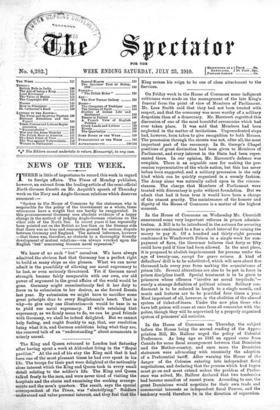On Friday week in the House of Commons some indignant
criticisms were made on the management of the late King's funeral from the point of view of Members of Parliament. Mr. Lees Smith said that they had not been treated with respect, and that the ceremony was more worthy of a military despotism than of a democracy. Mr. Harcourt regretted this discussion of one of the most beautiful ceremonies which had ever taken place. It was said that Members bad been neglected in the matter of invitations. Unprecedented steps bad, however, been taken to give recognition to both Houses. The procession through the streets was not, after all, the most important part of the ceremony. In St. George's Chapel positions of great distinction had been given to Members of Parliament, and every interest in the State had been repre- sented there. In our opinion, Mr. Harcourt's defence was complete. There is an arguable case for making the pro- cession representative of the whole nation, but this has never before been suggested, and a military procession is the only kind which can be quickly organised in a seemly fashion. The Army alone was naturally called upon in the circum- stances. The charge that Members of Parliament were treated with discourtesy is quite without foundation. But we admit that had it been true it would have been a charge of the utmost gravity. The maintenance of the honour and dignity of the House of Commons is a matter of the highest moment.






































